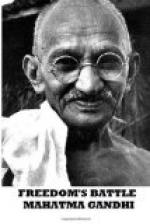The situation is clear. We are Pariahs in our own home. We get only what Government intend to give, not what we demand and have a right to. We may get the crumbs, never the loaf. I have seen large and tempting crumbs from a lavish table. And I have seen the eyes of our Pariahs—the shame of Hinduism—brightening to see those heavy crumbs filling their baskets. But the superior Hindu, who is filling the basket from a safe distance, knows that they are unfit for his own consumption. And so we in our turn may receive even Governorships which the real rulers no longer require or which they cannot retain with safety for their material interest—the political and material hold on India. It is time we realised our true status.
VIII. NON-CO-OPERATION
A writer in the “Times of India,” the Editor of that wonderful daily and Mrs. Besant have all in their own manner condemned non-co-operation conceived in connection with the Khilafat movement. All the three writings naturally discuss many side issues which I shall omit for the time being. I propose to answer two serious objections raised by the writers. The sobriety with which they are stated entitles them to a greater consideration than if they had been given in violent language. In non-co-operation, the writers think, it would be difficult if not impossible to avoid violence. Indeed violence, the “Times of India” editorial says, has already commenced in that ostracism has been resorted to in Calcutta and Delhi. Now I fear that ostracism to a certain extent is impossible to avoid. I remember in South Africa in the initial stages of the passive resistance campaign those who had fallen away were ostracised. Ostracism is violent or peaceful in according to the manner in which it is practised. A congregation may well refuse to recite prayers after a priest who prizes his title above his honour. But the ostracism will become violent if the individual life of a person is made unbearable by insults innuendoes or abuse. The real danger of violence lies in the people resorting to non-co-operation becoming impatient and revengeful. This may happen, if, for instance, payment of taxes is suddenly withdrawn or if pressure is put upon soldiers to lay down their arms. I however do not fear any evil consequences, for the simple reason that every responsible Mahomedan understands that non-co-operation to be successful must be totally unattended with violence. The other objection raised is that those who may give up their service may have to starve. That is just a possibility but a remote one, for the committee will certainly make due provision for those who may suddenly find themselves out of employment. I propose however to examine the whole of the difficult question much more fully in a future issue and hope to show that if Indian-Mahomedan feeling is to be respected, there is nothing left but non-co-operation if the decision arrived at is adverse.




